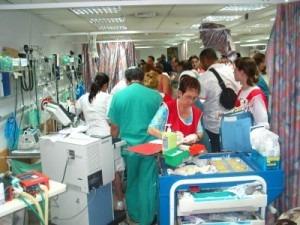Emergency responseBetter hospital responses to terrorist attacks
Terrorist attacks are less likely to occur than other disasters, but they can have greater impact on hospital operations; until the 9/11 and anthrax attacks, hospital emergency preparedness programs had not included provisions for terrorism events; those attacks changed that, but there is still much that should be done

Chaotic emergency room // Source: scoop.it
Research and Markets has a new offering: “Hospital Planning For Terrorist Disasters: A Community-Wide Program.”
Terrorist attacks are less likely to occur than other disasters, but they can have greater impact on hospital operations. Hospital emergency preparedness programs had not included provisions for terrorism events, but the 9/11 attacks was the catalyst that convinced many emergency management officials of the need for such plans.
Following the anthrax bioterrorism attacks in late September 2001, the U.S. Centers for Disease Control and Prevention (CDC) began focusing on emergency operations systems for public health facilities. Despite the limited number of direct victims in those attacks (twenty-two people), the public health effects were widespread, with large numbers of people receiving antibiotic prophylaxis. Psychological effects were also considerable.
Research and Markets note that in order to develop an effective emergency preparedness plan, hospital leaders should build on previous experiences with disaster management, especially with respect to human behavior, as well as on published research. The book is intended to complement resources such as the U.S. Department of Health and Human Services’ Public Health Emergency Response Guide and assist hospital planners in preparing for terrorism events and other disasters.
